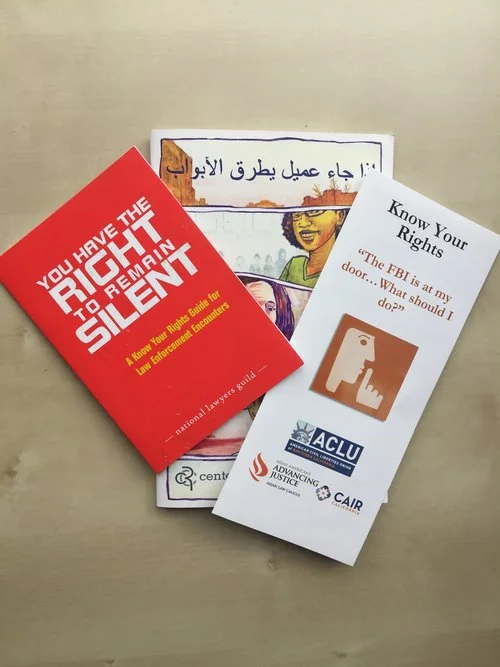Advisory on FBI Visits to Palestine Activists (Updated)
/In February, Palestine Legal issued an advisory regarding FBI visits to Palestine activists. Following is an update to the advisory to provide context about these visits and to describe trends we have observed based on information activists have reported to us.
FBI agents conduct online research prior to questioning activists.
It appears that the FBI relies on information available online when they receive a tip about an individual, and that agents base their decision on whether to contact an activist for follow-up questioning partly on the information they find online about the individual or groups with which they are affiliated. For example:
- In at least two of the visits reported to us, the agent relied on false allegations published on fringe websites or by right-wing anti-Palestinian activists. Read about one example, where an agent showed up with a Canary Mission printout, here.
- In a third, the agent’s questions mirrored false allegations made by right-wing extremist David Horowitz in a mainstream outlet.
If you have legal questions related to your Canary Mission profile or other false accusations on the internet, please contact us.
FBI agents surveil social media accounts
People have reported to us that FBI agents were familiar with their Facebook and Twitter activity, even when privacy filters were used. We do not advise activists to censor their online activity, but it’s best to be thoughtful about what you post online. We encourage you to use privacy settings liberally, but to assume anything you post online could be made public.
FBI visits have occurred at homes, offices, and colleges
People have reported that they’ve been contacted by FBI agents in person at their homes, workplaces, and colleges, as well as by telephone.
We advise individuals to not speak to FBI agents without a lawyer present. Tell the agents that you will have your lawyer contact them. Remember not to let an agent into your home unless they have a valid warrant. See below for more information about how to handle an FBI visit.
Below is our original advisory, published on Feb. 14, 2018:
This week, two FBI agents visited the home of a University of California Los Angeles student and asked them questions about their student activism for Palestinian rights.
This is not the first FBI encounter reported to our office. However, the line of questioning reflects intensifying efforts to criminalize protected political speech and human rights advocacy. State surveillance of social justice movements is not new; it has been used to intimidate activists both historically and in the current climate.
Be prepared to handle an FBI visit.
If an agent knocks on your door:
- Do not answer any questions. You have a constitutional right to remain silent, and you should exercise it.
- Do not let them in your house/apt. Step outside and close the door behind you. Or talk to them through the door (preferable). Only give them permission to enter if they show you a warrant signed by a judge that accurately lists your address and apartment number.
- Say, "Please leave your business card, my lawyer will call you." Repeat it over and over and over again, no matter how nice they are. Do not say anything else. You do not have to inform them who your lawyer is.
- Do not answer any questions. If it makes sense for you to do an interview, your (free) lawyer will help you with that!
- Never lie, about anything. Even a white lie, or a harmless lie. It can be a crime to lie to an agent.
- Share this with your roommates, parents, and any others who might open the door on your behalf, and make sure they understand what to do.
- Do not answer any questions.
- If you or your roommate mistakenly lets an agent in or starts speaking with them, end the conversation and tell them you have nothing more to say, that your lawyer will contact them, and that you’d like them to leave (unless they present a warrant).
- Get in touch with Palestine Legal as soon as possible.
The best response is to react with confidence that you know your rights, not panic.
For more info, check out these resources:
If an Agent Knocks, Center for Constitutional Rights
You Have the Right to Remain Silent, Know Your Rights Guide, National Lawyers Guild


